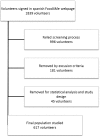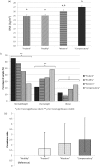Analysis of Dietary Pattern Impact on Weight Status for Personalised Nutrition through On-Line Advice: The Food4Me Spanish Cohort
- PMID: 26593942
- PMCID: PMC4663610
- DOI: 10.3390/nu7115482
Analysis of Dietary Pattern Impact on Weight Status for Personalised Nutrition through On-Line Advice: The Food4Me Spanish Cohort
Abstract
Obesity prevalence is increasing. The management of this condition requires a detailed analysis of the global risk factors in order to develop personalised advice. This study is aimed to identify current dietary patterns and habits in Spanish population interested in personalised nutrition and investigate associations with weight status. Self-reported dietary and anthropometrical data from the Spanish participants in the Food4Me study, were used in a multidimensional exploratory analysis to define specific dietary profiles. Two opposing factors were obtained according to food groups' intake: Factor 1 characterised by a more frequent consumption of traditionally considered unhealthy foods; and Factor 2, where the consumption of "Mediterranean diet" foods was prevalent. Factor 1 showed a direct relationship with BMI (β = 0.226; r² = 0.259; p < 0.001), while the association with Factor 2 was inverse (β = -0.037; r² = 0.230; p = 0.348). A total of four categories were defined (Prudent, Healthy, Western, and Compensatory) through classification of the sample in higher or lower adherence to each factor and combining the possibilities. Western and Compensatory dietary patterns, which were characterized by high-density foods consumption, showed positive associations with overweight prevalence. Further analysis showed that prevention of overweight must focus on limiting the intake of known deleterious foods rather than exclusively enhance healthy products.
Keywords: dietary habits; dietary pattern; obesity; personalised nutrition.
Figures




References
Publication types
MeSH terms
LinkOut - more resources
Full Text Sources
Other Literature Sources
Medical

